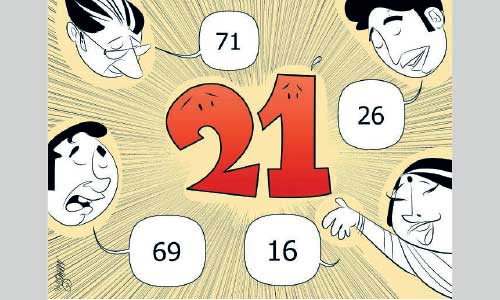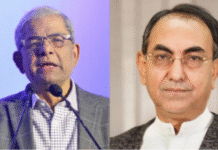Only two plays have been produced on the subject of language movement since 1952 although a number of theatre productions drew upon it in one way or another, theatre officials said.
The first and foremost play on this subject is Munier Chowdhury’s Kabar, which he wrote while in prison during the movement in 1952. Another is Kaiser Ahmed’s Bayannor Shakun, which ceased to be staged since after 1980s – making the former the only language play in existence.
Theatre activists say the 1952 movement remains quite neglected in theatre mainly because of the difficulty and lack of interest in recreating a historical event like this.
‘The language movement is a very important part of our history. Sadly, it remains underrepresented in our theatre,’ said thespian Nasiruddin Yousuff. ‘I see no reason why there should be a situation like this, especially when we have such a thriving theatre culture with so many functional troupes.’
Another thespian, Mamunur Rashid, termed the situation ‘shameful’ but said the movement, as a theme, remains neglected in other creative genres, too.
‘The importance of keeping the theme alive and creating awareness of linguistic diversity through plays has increased manifold after the UNESCO announcement of February 21 as the International Mother Language Day.
‘That being said, even for a meritorious playwright, writing a play on the movement is not easy. It requires time and patience and research,’ he said, adding that even street plays have barely touched upon the subject.
Bangladesh Group Theatre Federation has been organising a weeklong street theatre festival dedicated to the language movement for the last 30 years. Bangladesh Path Natok Parishad also organises a theatre festival regularly.
These festivals, Mamunur said, feature barely any language-themed play.
Akhteruzzaman, secretary general of BGTF, argued that in many street theatre productions depicting historical events, the language movement appears only ‘as part of a bigger plot, if not the plot itself.’
‘This is unexpected. Street theatre productions may, because of the nature of their formation, have to deal with contemporary issues but a space can certainly be created for historically important events,’ he said.
Veteran theatre activist Ataur Rahman thinks that a combined effort by Bangladesh Group Theatre Federation, Bangladesh Shilpakala Academy and Bangladesh Path Natok Parishad can change the situation.
‘There is no lack of understanding the importance of language movement in our theatre circles; we just need to walk the walk now,’ he said.
Bangladesh Shilpakala Academy’s director general Liaquat Ali Lucky said last year the academy initiated a project to produce plays on historic events. ‘Some of these plays, produced by the academy’s district branches, deal with the language movement,’ he said.
‘But there still remains a dearth of full-length productions on this subject. It’s quite challenging to produce a language play but we are moving in that direction,’ said Lucky, also the chairman of BGTF.
The first and foremost play on this subject is Munier Chowdhury’s Kabar, which he wrote while in prison during the movement in 1952. Another is Kaiser Ahmed’s Bayannor Shakun, which ceased to be staged since after 1980s – making the former the only language play in existence.
Theatre activists say the 1952 movement remains quite neglected in theatre mainly because of the difficulty and lack of interest in recreating a historical event like this.
‘The language movement is a very important part of our history. Sadly, it remains underrepresented in our theatre,’ said thespian Nasiruddin Yousuff. ‘I see no reason why there should be a situation like this, especially when we have such a thriving theatre culture with so many functional troupes.’
Another thespian, Mamunur Rashid, termed the situation ‘shameful’ but said the movement, as a theme, remains neglected in other creative genres, too.
‘The importance of keeping the theme alive and creating awareness of linguistic diversity through plays has increased manifold after the UNESCO announcement of February 21 as the International Mother Language Day.
‘That being said, even for a meritorious playwright, writing a play on the movement is not easy. It requires time and patience and research,’ he said, adding that even street plays have barely touched upon the subject.
Bangladesh Group Theatre Federation has been organising a weeklong street theatre festival dedicated to the language movement for the last 30 years. Bangladesh Path Natok Parishad also organises a theatre festival regularly.
These festivals, Mamunur said, feature barely any language-themed play.
Akhteruzzaman, secretary general of BGTF, argued that in many street theatre productions depicting historical events, the language movement appears only ‘as part of a bigger plot, if not the plot itself.’
‘This is unexpected. Street theatre productions may, because of the nature of their formation, have to deal with contemporary issues but a space can certainly be created for historically important events,’ he said.
Veteran theatre activist Ataur Rahman thinks that a combined effort by Bangladesh Group Theatre Federation, Bangladesh Shilpakala Academy and Bangladesh Path Natok Parishad can change the situation.
‘There is no lack of understanding the importance of language movement in our theatre circles; we just need to walk the walk now,’ he said.
Bangladesh Shilpakala Academy’s director general Liaquat Ali Lucky said last year the academy initiated a project to produce plays on historic events. ‘Some of these plays, produced by the academy’s district branches, deal with the language movement,’ he said.
‘But there still remains a dearth of full-length productions on this subject. It’s quite challenging to produce a language play but we are moving in that direction,’ said Lucky, also the chairman of BGTF.
Source: New Age










